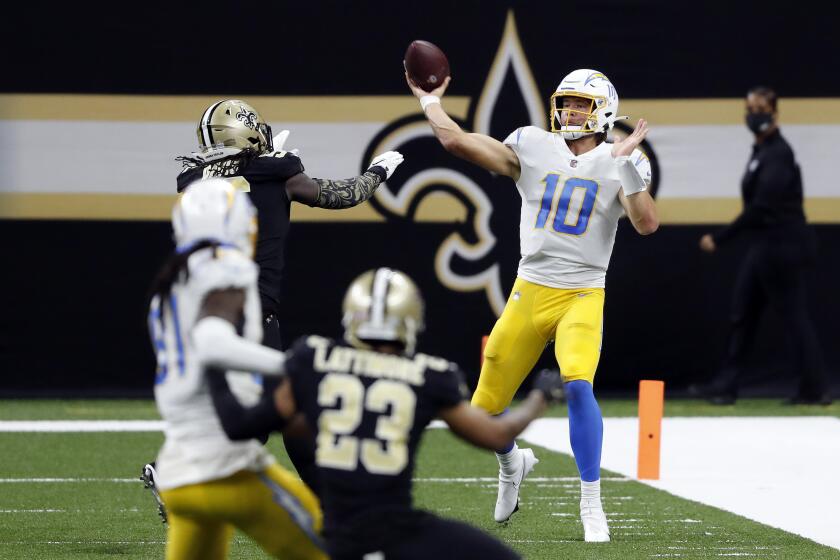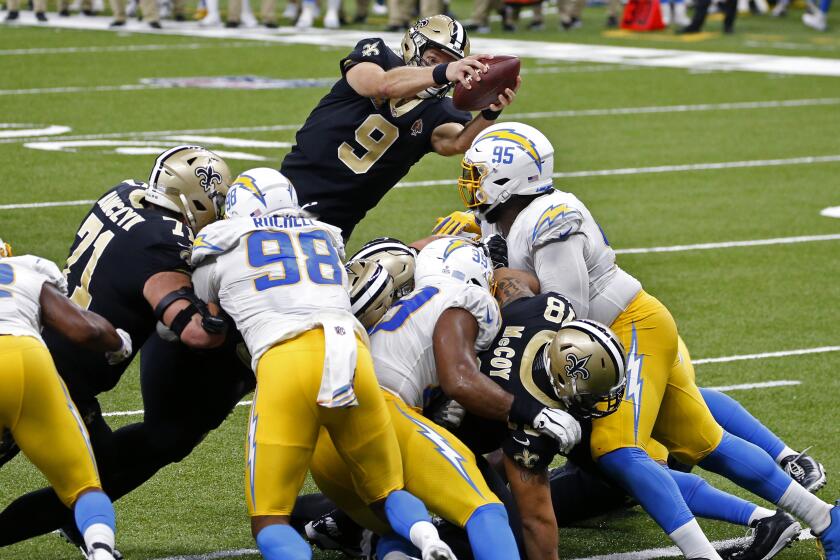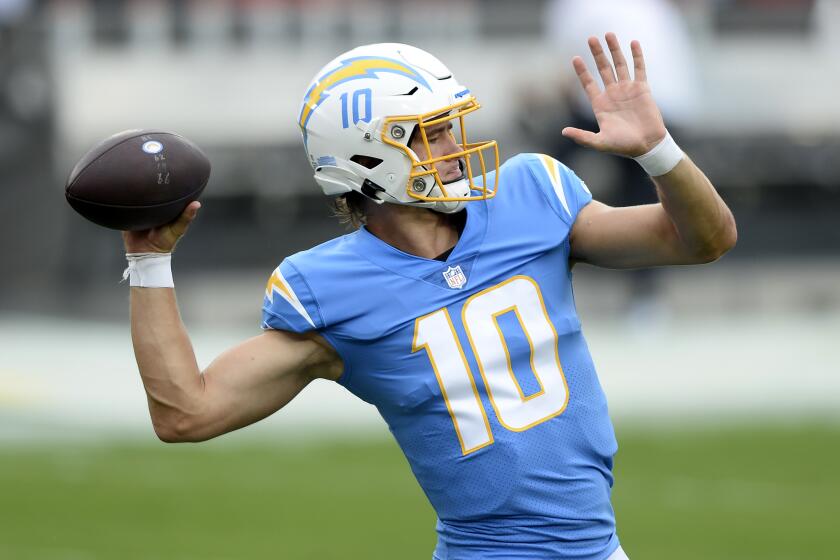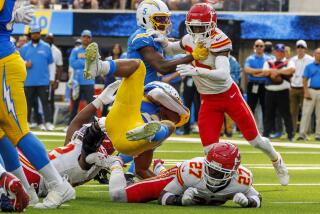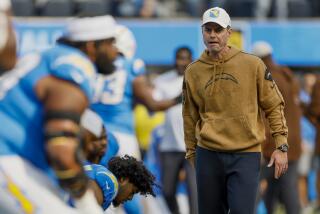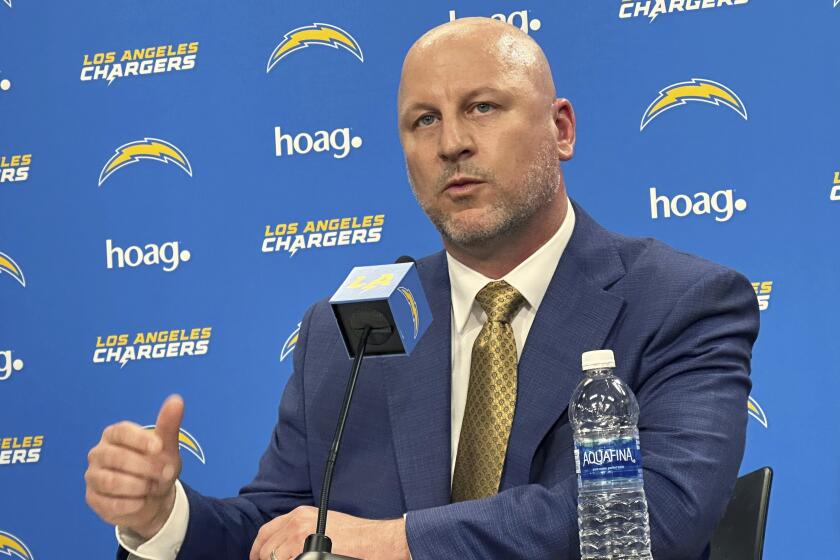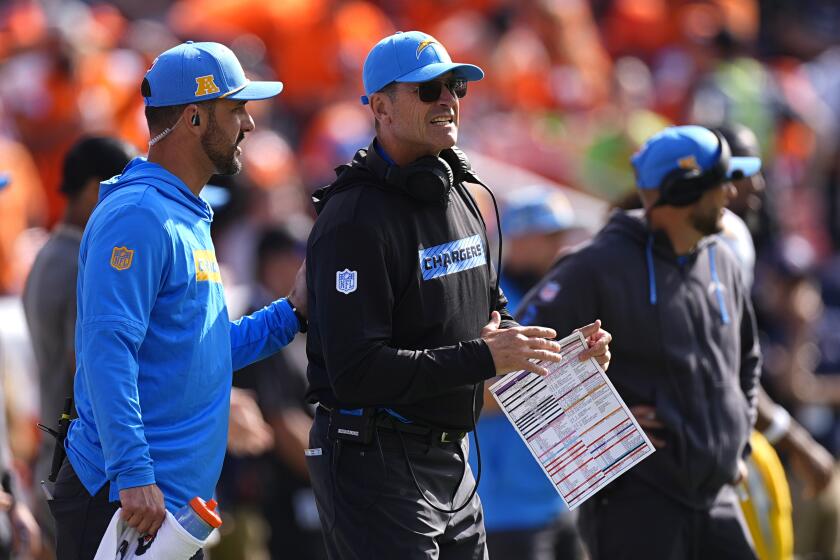Chargers coordinator Gus Bradley very precise about problems with defense
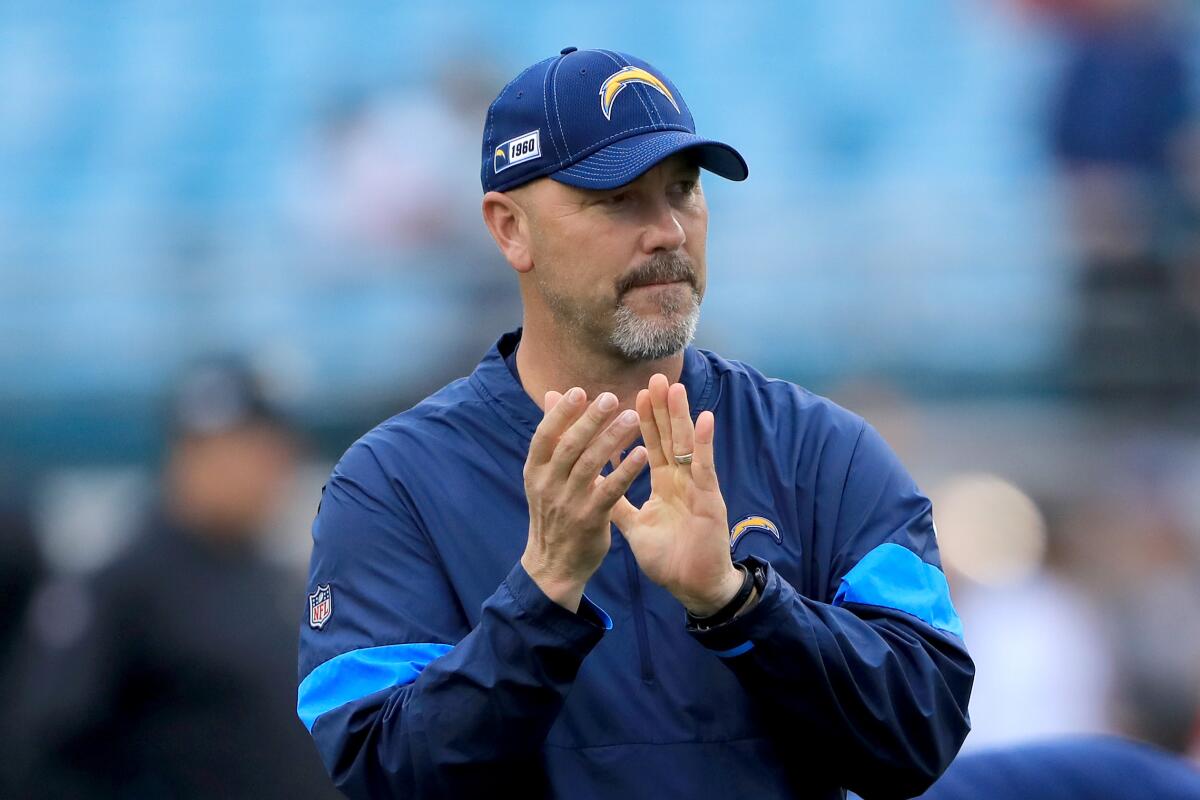
The Chargers entered this season intent on being less predictable and more diversified on defense.
With the team sitting at 1-4, the transition has included some painful moments.
“If we’re going to do more, like we are, then we just gotta be on the details more,” defensive coordinator Gus Bradley said. “Each player has to play it like that’s the most important play.”
Bradley’s scheme traditionally includes limited blitzing and zone coverage in the secondary, the goal being to minimize big plays. By keeping things relatively simple, defenders are allowed to play faster.
In an attempt to increase their aggressiveness, affect the quarterback more often and generate turnovers, the Chargers have been blitzing more on third down and playing man-to-man at times.
But after allowing 19 points per game through three weeks, Bradley’s defense suffered multiple breakdowns in surrendering 68 points in losses at Tampa Bay and New Orleans.
The Chargers had big half time leads against Kansas City, Tampa Bay and New Orleans before losing down the stretch.
The Chargers blew 17-point second-quarter leads in both games, the respective comebacks ignited when the defense couldn’t prevent touchdowns in the closing seconds of the first half.
“Because you’re doing more things, you lose a little bit of precision,” Bradley said. “One of the things we found out, in a chaotic environment, like against a two-minute [offense], sometimes we lose some of that precision.”
The Chargers permitted the Saints to go 51 yards in eight plays, with Drew Brees scoring on a one-yard run with 14 seconds remaining in the second quarter.
That possession began with an incomplete pass, but then Brees connected on five in a row to put the Saints on the fringe of the end zone.
“We’re not winning enough plays,” Bradley said. “If there’s eight plays, there’s three of them where we’re not on it, not detailed enough. That’s just building trust as a team that everybody’s going to do their job.”
The Chargers have a problem with giving up points in the second half of football games, and it’s a big culprit behind their four-game losing streak.
Against the Buccaneers, the Chargers flatly melted down after halftime, particularly in the secondary. Tom Brady finished the half 15 of 17 for 263 yards and three touchdowns. His passer rating was above 150.
The collapse was the result of several blown assignments and repeated instances of miscommunication. That’s part of the risk of asking more from defenders used to playing a less dimensional style.
Explaining that the Chargers want to use the scheme changes “to kind of throw a curveball” at the opposition, Bradley said the dilemma is finding the right balance that will permit the defense to flourish.
He said the coaches “took a hard look” at what they’re asking from the defense during the off week. He expressed confidence in the Chargers’ ability to right their recent wrongs.
“I thought it was probably, since we’ve been here, our best off week as far as really self-scouting,” Bradley said. “We just to have make sure we’re not getting too far away from what we’re doing.”
Rookie blitz
Rookie quarterbacks are supposed to struggle adjusting to the pressure that NFL defenses can bring. But Justin Herbert, as he has with so many other things during this first four games, has risen above that expectation.
When facing the blitz on third down, Herbert is seven for nine for 173 yards and two touchdowns, according to the Chargers. That’s a passer rating of 158.3, which is considered perfect.
Herbert is No. 1 in the NFL in that category among qualifying quarterbacks. Second on the list is Patrick Mahomes. Ben Roethlisberger is third.
Chargers rookie Justin Herbert plays the game much differently that predecessor Philip Rivers, and his measured approach has had its highs and lows.
Asked about his ability to perform in the teeth of the blitz, Herbert credited the Chargers’ coaches first. Then he mentioned the offensive line and the running backs who are assigned to pick up blitzing defenders.
“When all those pieces come together,” he said, “it makes me look a lot better than what’s really going on.”
Maybe so, but the rookie’s teammates remain no less impressed by what they’ve seen from Herbert.
“Once he puts everything in order, he’s going to be elite,” veteran defensive tackle Linval Joseph said. “He’s going to be great.”
Etc.
Wide receiver K.J. Hill didn’t practice Thursday because of a hip injury suffered this week, casting doubt on his availability for Sunday, when the Chargers play Jacksonville at SoFi Stadium. … Quarterback Tyrod Taylor (ribs) has practiced in full the past two days and probably will return against the Jaguars to be Herbert’s backup. … The Chargers have several key players — Joseph (elbow), wide receiver Keenan Allen (back), right tackle Bryan Bulaga (back) and running back Justin Jackson (knee) — who remain limited in practice. The official game status of each will be announced Friday. … Linebacker Kenneth Murray Jr. is third among NFL rookies in tackles with 38. He has played 92% of the team’s defensive snaps, the most of any defensive player drafted in the 2020 first round.
More to Read
Go beyond the scoreboard
Get the latest on L.A.'s teams in the daily Sports Report newsletter.
You may occasionally receive promotional content from the Los Angeles Times.

